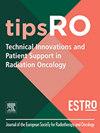Perceptions, educational expectations and knowledge gaps of patients with non-metastatic breast cancer regarding radiotherapy: Integrative review
IF 2.8
Q1 Nursing
Technical Innovations and Patient Support in Radiation Oncology
Pub Date : 2025-04-20
DOI:10.1016/j.tipsro.2025.100312
引用次数: 0
Abstract
Objective
This integrative review investigates perceptions, educational expectations, and knowledge gaps of patients with breast cancer (BC) regarding radiotherapy (RT).
Methods
The included studies were analysed using a thematic analysis approach. Each segment of data was coded with open coding. The codes were gathered into subthemes as they emerged and into overarching themes, after which the data was analysed again.
Results
22 studies were included: 11 qualitative, 10 cross-sectional, and 1 case study. Our findings indicate that breast cancer patients perceptions of radiation therapy (RT) are influenced by their understanding of RT, its side effects, the treatment burden, emotional state or feelings, effectiveness if RT, prognosis, and viewing RT as the end-of-care phase. They expect education on the treatment pathway, psychosocial support, personalised aspects of RT, planning, delivery, follow-up, and side effects. Additionally, women undergoing RT have knowledge gaps related to preparedness and support, unforeseen risks and side effects, as well as daily practical issues.
Conclusion
Tailored, culturally sensitive education is essential to bridge gaps in understanding, manage anxiety, and build trust. It requires individualized communication strategies and psychosocial support. By integrating personalized information and leveraging technological solutions, healthcare providers can empower patients, improve adherence, and enhance outcomes, particularly in resource-limited settings.
非转移性乳腺癌患者对放疗的认知、教育期望和知识差距:综合评价
目的:研究乳腺癌(BC)患者对放疗(RT)的认知、教育期望和知识差距。方法采用专题分析法对纳入的研究进行分析。每段数据采用开放编码进行编码。这些代码在出现时被收集成次级主题和总体主题,之后再对数据进行分析。结果共纳入22项研究:11项定性研究,10项横断面研究,1项个案研究。我们的研究结果表明,乳腺癌患者对放射治疗(RT)的认知受其对放疗的理解、其副作用、治疗负担、情绪状态或感受、放疗的有效性、预后以及将放疗视为临终关怀阶段的影响。他们期望接受有关治疗途径、社会心理支持、治疗个性化、计划、交付、随访和副作用方面的教育。此外,接受放射治疗的妇女在准备和支持、不可预见的风险和副作用以及日常实际问题方面存在知识差距。结论量身定制的文化敏感教育对于弥合理解差距、管理焦虑和建立信任至关重要。它需要个性化的沟通策略和社会心理支持。通过集成个性化信息和利用技术解决方案,医疗保健提供者可以增强患者的能力,提高依从性,并改善结果,特别是在资源有限的环境中。
本文章由计算机程序翻译,如有差异,请以英文原文为准。
求助全文
约1分钟内获得全文
求助全文
来源期刊

Technical Innovations and Patient Support in Radiation Oncology
Nursing-Oncology (nursing)
CiteScore
4.10
自引率
0.00%
发文量
48
审稿时长
67 days
 求助内容:
求助内容: 应助结果提醒方式:
应助结果提醒方式:


